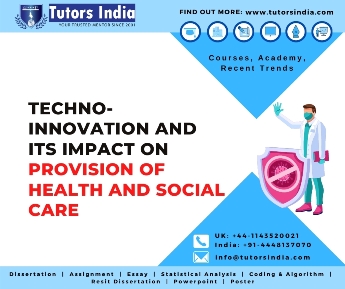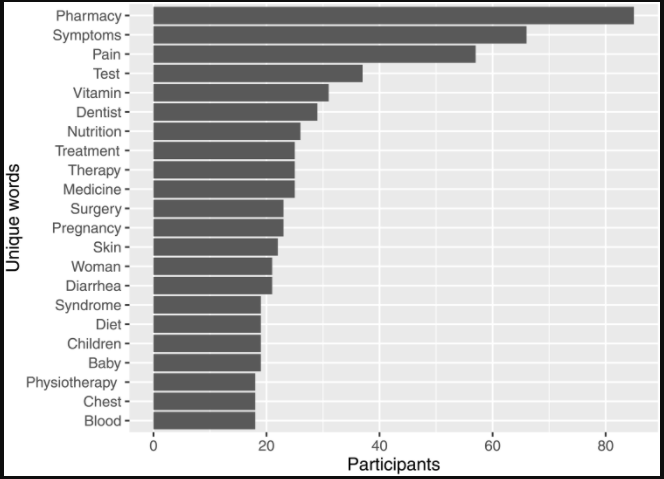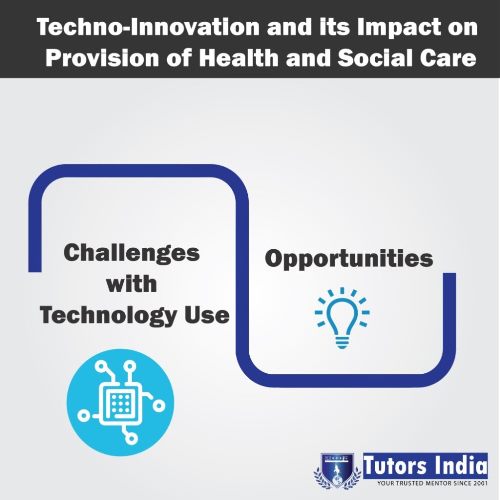Techno-Innovation and its Impact on Provision of Health and Social Care
Introduction
The scope for technological innovation for transforming the provision of health and social care has been widely recognized across a large spectrum of domains and this , also comprise of services relating to mental health [1], cases of substance abuse [2] and to extend support to people who are categorized as differently abled [3]. While the use of technology is a good thing, a contrasting aspect that has emerged would refer to the concerns related to privacy, ethics and ramifications in terms of social justice with regards to the use of such innovative technology. Technological developments over the years, especially those involving mobile digital information and communication technology is consistently developing at a rate which is highly exponential. Thus facilitating communication, information acquisition in highly innovative ways. It has been observed that during 2013 around 36 million adults within the UK (73%) were regularly accessing internet on a daily basis while 72% amongst all adults purchased goods and services online [4].

The number of people who accessed the internet using smart phones literally doubled in the period between 2010 – 2013 to 53%. On the whole, the number of adults within the UK who owned a smartphone was found to be around 51% (double of what it was in 2011) and at the same time, around 24% of adults are also known to have a tablet. It has also been reported that around 43% from all adults in the UK were now utilizing the internet to gain information pertaining to health. This trend has witnessed an increase by 18% since 2007.

Figure 1: Health related Queries using Smartphones – Keywords used
Source: Bach and Wenz [5]
[Interesting with health related statistics? Looking to write a health dissertation writing help online.]
The purpose of this paper is to investigate the challenges as well as opportunities associated with a growing use of technology within this context. At the outset, some specific challenges would be presented and this would be followed by an attempt to consider technology that would revolutionize several areas in terms of delivery of social and healthcare.

Challenges with Technology Use
The foremost challenge associated with the introduction of techno-driven innovation in the domain of social and healthcare would pertain to the capability of staff, their motivation and training [6]. The provision of social and healthcare has conventionally depended on interactions that were largely face-to-face as a mode of practice. Thus, any change in the interpersonal nature of interactions has scope to be confronted as a challenge on account of the status quo, and professionals who are worried that the skills they possess would not be applicable to such changing settings [7]. Therefore, it would not come across as a surprise when the sector of social care and health have been found to be comparatively slow in adopting and embracing such novel techno-developments, especially in comparison with organizations that are operating in the private sector [8]. Apart from such practical challenges, issues pertaining to ethics have also during the use of innovative technology has emerged as a challenge. One key challenge being that technology is exacerbating certain critical issues that have to be dealt by health and social care professionals on a daily basis. For instance, it has been indicated through research that excessive use of technology is causing depression [9].
Opportunities
Irrespective of the challenges presented by technological innovation, it is a matter of much significance that the concerns above mentioned would not result in an illogical tendency towards a scepticism for technologyat the cost of the advantages or opportunities presented through innovative technologies. As a m tter of fact, it has been observed that innovative technology on its own is largely neutral and issues related to ethics only arise with regards to how it has been or is being used. This viewpoint has been projected by Patricia M. Greenfield [10], who deliberates that the influence of any kind of technological development would hinge on the manner in which it is used, and further emphasizes that it would be naïve to deem technology of any kind to be essentially negative or positive. For instance, though it has been acknowledged younger people are exposed to certain risks from technology, it would be necessary to understand that technology offers a medium that allows the scope for creating engagement with younger people, specifically young men, a category that social care and health agencies have been struggling to engage. It has also been revealed that certain conventional interpersonal interventions like person-centric counselling, could be provided in an effective manner with the help of new mediums of technology.
Conclusion
This brief essay has clearly revealed certain specific challenges and opportunities that are in existence for technological innovation within the context of delivering social and health care. However, what is to be understood is that it is the onus of managers, practitioners and policy makers within the domain who have the power to mould the influence that such kind of technological innovations could make. Some commonly observed challenges of technology have been covered through this essay, while taking into account the opportunities that are also in existence along with the challenges.
Tutors India offers the best healthcare thesis and essay writing project help online. The US & UK medical writers at Tutors India aim at inculcating knowledge within students and build a great confidence to submit their medicine academic writing successfully.
References
[1] C. Hollis et al., “Technological innovations in mental healthcare: harnessing the digital revolution,” Br. J. Psychiatry, vol. 206, no. 4, pp. 263–265, Apr. 2015, doi: 10.1192/bjp.bp.113.142612.
[2] M. Bandawar, V. L. Narasimha, and P. Chand, “Use of digital technology in addiction disorders.,” Indian J. Psychiatry, vol. 60, no. Suppl 4, pp. S534–S540, Feb. 2018, doi: 10.4103/psychiatry.IndianJPsychiatry_21_18.
[3] I. Svensson et al., “Effects of assistive technology for students with reading and writing disabilities,” Disabil. Rehabil. Assist. Technol., vol. 16, no. 2, pp. 196–208, Feb. 2021, doi: 10.1080/17483107.2019.1646821.
[4] Ofcom, “The Communications Market 2013,” 2013. https://www.ofcom.org.uk/research-and-data/multi-sector-research/cmr/cmr13 (accessed Aug. 01, 2021).
[5] R. L. Bach and A. Wenz, “Studying health-related internet and mobile device use using web logs and smartphone records,” PLoS One, vol. 15, no. 6, p. e0234663, Jun. 2020, doi: 10.1371/journal.pone.0234663.
[6] P. Gillingham, “Electronic Information Systems and Human Service Organizations: The Unanticipated Consequences of Organizational Change,” Hum. Serv. Organ. Manag. Leadersh. Gov., vol. 39, no. 2, pp. 89–100, Mar. 2015, doi: 10.1080/23303131.2014.987412.
[7] C. Berzin, S. C., Singer, J., & Chan, “Practice Innovation through Technology in the Digital Age: A Grand Challenge for Social Work,” 2015, [Online]. Available: https://grandchallengesforsocialwork.org/wp-content/uploads/2015/12/WP12-with-cover.pdf.
[8] M. Shahbaz, C. Gao, L. Zhai, F. Shahzad, and Y. Hu, “Investigating the adoption of big data analytics in healthcare: the moderating role of resistance to change,” J. Big Data, vol. 6, no. 1, p. 6, Dec. 2019, doi: 10.1186/s40537-019-0170-y.
[9] W. T. Mok, R. Sing, X. Jiang, and S. L. See, “Investigation of social media on depression,” in The 9th International Symposium on Chinese Spoken Language Processing, Sep. 2014, pp. 488–491, doi: 10.1109/ISCSLP.2014.6936690.
[10] Patricia M. Greenfield, “Mind and Media The Effects of Television, Video Games, and Computers,” 2014, [Online]. Available: https://www.routledge.com/Mind-and-Media-The-Effects-of-Television-Video-Games-and-Computers/Greenfield/p/book/9781138805958.

 Previous Post
Previous Post Next Post
Next Post